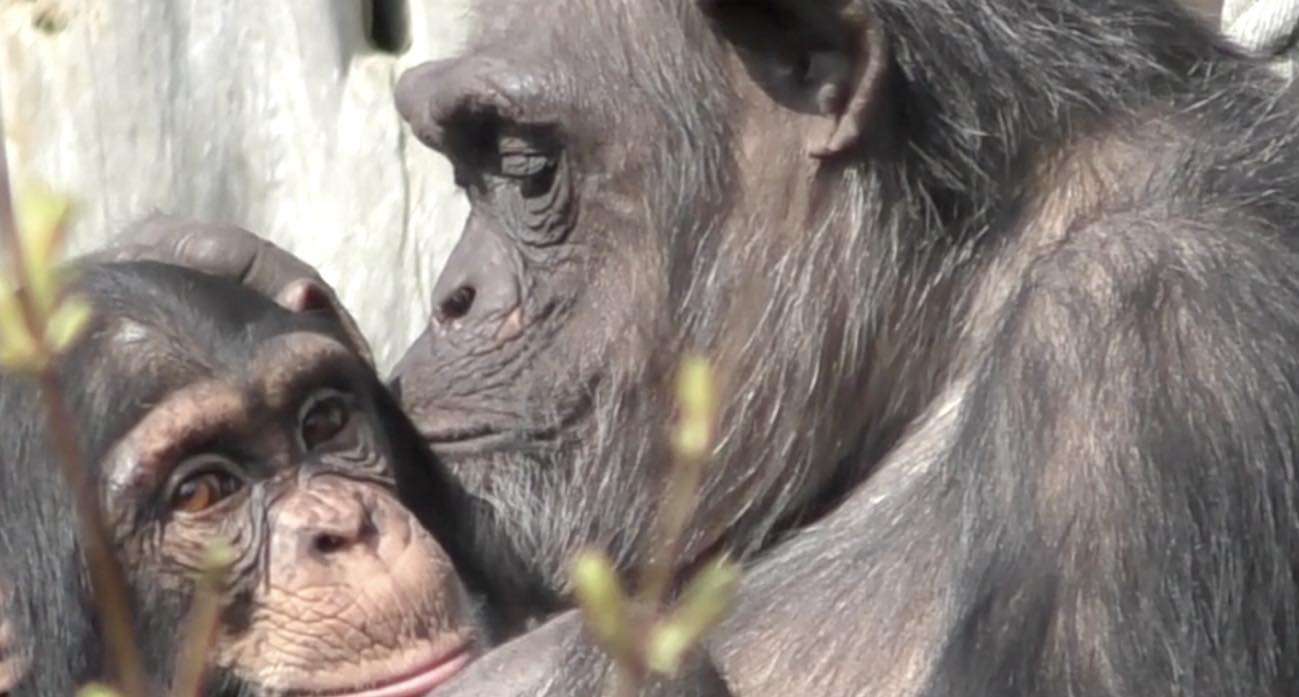Scientist Photographs Once in a Lifetime Sighting of Bird with Half Male and Half Female Plumage
Half of its body was blue, which meant that the men were looking at a "bilateral gynandromorph," or a bird that was half male half female.

Apes can recognize friends they haven't seen for decades, reveals new research from Johns Hopkins University.
The study, documenting the longest lasting non-human social memories ever recorded, found that apes recognize photos of group mates they haven't seen for more than 25 years, and respond even more enthusiastically to pictures of their friends.
The research team said their findings, published yesterday in the journal Proceedings of the National Academy of Sciences, underscore how human culture evolved from the common ancestors we share with these primates, our closest relatives.
"We tend to think about great apes as quite different from ourselves but we have really seen these animals as possessing cognitive mechanisms that are very similar to our own, including memory," said one of the study's authors, Dr Laura Lewis, a biological anthropologist at University of California, Berkeley.
"I think that is what's so exciting about this study."
The research team was inspired to pursue the question of how long apes remember old pals through their own experiences working with primates – the sense that the animals recognized them when they'd visit, even if they'd been away for a long time.
"You have the impression that they're responding like they recognize you and that to them you're really different from the average zoo guest," said the study's senior author Dr. Christopher Krupenye of Johns Hopkins.
"They're excited to see you again."
Such emotion was captured on film in 2016 when a 59-year-old chimpanzee-the matriarch of the famous chimpanzee colony of the Royal Burgers Zoo in the Netherlands-was dying of old age. The Dutch biologist Jan van Hooff, who was co-founder of the Burgers colony and had known 'Mama' for decades, visited her before she died. Once she became aware of Jan's presence, even though not seeing him for a long time, her reaction was extremely emotional and warmed the hearts of all the caregivers.
So the goal with this study was to ask, empirically, if that's the case: Do they really have a robust lasting memory for familiar social partners?
The results showed that chimpanzees and bonobos recognize individuals even though they haven't seen them for multiple decades-and then there's a small but significant pattern of greater attention toward individuals with whom they had more positive relationships.
"It suggests that this is more than just familiarity, that they're keeping track of aspects of the quality of these social relationships," said Dr. Krupenye.
The researchers worked with chimps and bonobos at three locations: Edinburgh Zoo in Scotland, Planckendael Zoo in Belgium, and Kumamoto Sanctuary in Japan.
The team collected photographs of apes that had either left the zoos or died, individuals that participants hadn't seen for at least nine months and in some cases for as long as 26 years. The researchers also collected information about the relationships each participant had with former group mates-if there had been positive or negative interactions between them.
The team invited apes to participate in the experiment by offering them juice, and while they sipped it, the apes where shown two side-by-side photographs-apes they'd once known and total strangers.
Using a non-invasive eye-tracking device, the team measured where the apes looked and for how long, observing that the apes looked "significantly" longer at former group mates, no matter how long they'd been apart.
And they looked longer still at their former friends, those they'd had more positive interactions with.
In one of the most extreme cases, during the experiment, bonobo Louise had not seen her sister Loretta nor nephew Erin for more than 26 years at the time of testing. She showed a "strikingly robust" looking bias toward both of them over eight trials. Watch the researchers' video below…
The results suggest great ape social memory could last beyond 26 years, the majority of their 40- to 60-year average lifespan, and could be comparable to that of humans, which begins to decline after 15 years but can persist as long as 48 years after separation.
Such long lasting social memory suggests that this kind of memory was likely already present millions of years ago in our common evolutionary ancestors.
Krupenye says the idea that apes remember information about the quality of their relationships is another new and human-like finding of the work.
The study also raises the questions of whether the apes are missing individuals they're no longer with, especially their friends and family.
"The idea that they do remember others and therefore they may miss these individuals is really a powerful cognitive mechanism and something that's been thought of as uniquely human," said Dr. Lewis.
"Our study doesn't determine they are doing this, but it raises questions about the possibility that they may have the ability to do so."
The researchers now plan to explore whether long-lasting social memories are special to great apes or something experienced by other primates.
SHARE the News And Beautiful Video With Animal Lovers on Social Media…
Be the first to comment